How to Prevent Hair Loss: Tips for Men’s Hair Care
Hair loss is a common concern for men, particularly as they age. While it’s often seen as an inevitable part of getting older, there are several steps men can take to slow down or prevent hair loss. From understanding the causes to adopting preventive habits and using the right products, maintaining healthy hair is achievable with the right approach. This article explores various strategies for preventing hair loss, along with the most effective products to include in a comprehensive hair care routine.
Understanding Hair Loss in Men
Hair loss in men is largely attributed to a combination of genetics, hormones, and aging. The most common type is androgenetic alopecia (male pattern baldness), which affects over 60% of men by the age of 50. Other factors like stress, poor diet, and certain medical conditions can also lead to hair thinning or shedding.
Here are some of the leading causes of hair loss in men:
- Genetics: Family history plays a significant role in hair loss. Men who have relatives with baldness are more likely to experience it themselves.
- Hormones: Testosterone converts to dihydrotestosterone (DHT), a hormone that shrinks hair follicles, leading to shorter hair growth cycles and eventual hair thinning.
- Age: Hair growth slows down with age, and hair follicles can stop producing new hair altogether.
- Lifestyle Factors: Stress, poor diet, lack of sleep, and excessive styling or chemical treatments can also contribute to hair damage and loss.
How to Prevent Hair Loss: Tips for Healthy Hair
- Maintain a Balanced Diet: A diet rich in essential nutrients can have a major impact on hair health. Protein, iron, zinc, and vitamins A, D, and E are crucial for maintaining strong and healthy hair. Foods like eggs, spinach, nuts, and fish are excellent sources of these nutrients. Biotin (vitamin B7) is also particularly important for hair growth. You can find it in foods like eggs, almonds, and sweet potatoes, or take it as a supplement to support hair health.
- Stay Hydrated: Dehydration can lead to dry, brittle hair and hair loss. Ensure you’re drinking enough water each day to keep your scalp hydrated and hair follicles functioning properly.
- Minimize Stress: Chronic stress can trigger conditions like telogen effluvium, where hair enters the shedding phase prematurely. Managing stress through meditation, exercise, or relaxation techniques can help prevent hair loss linked to stress.
- Scalp Care: A healthy scalp is the foundation of strong hair. Scalp massages increase blood circulation to hair follicles, promoting growth. Regularly cleanse your scalp to remove excess oil and product buildup, which can clog hair follicles and impede growth.
- Limit Heat and Chemical Treatments: Frequent use of styling tools, hair dyes, or chemical treatments can weaken hair shafts and lead to breakage. Try to limit the use of heat tools, and when necessary, use a heat protectant to minimize damage.
- Use Gentle Hair Products: Harsh shampoos and hair products can strip the hair of natural oils, leaving it dry and prone to breakage. Look for products labeled as sulfate-free or those specifically designed to promote hair health. Gentle, hydrating shampoos and conditioners can help keep hair moisturized and strong.
- Get Enough Sleep: Your body repairs itself during sleep, including hair follicles. Ensure you’re getting at least 7-8 hours of quality sleep each night to support hair growth.
Effective Hair Care Products for Preventing Hair Loss
In addition to lifestyle changes, incorporating the right hair care products into your routine can significantly reduce hair thinning and encourage new growth. Below are some types of products that have been shown to help prevent hair loss:
- DHT Blockers: Since DHT is a key factor in hair loss, products that block DHT production can be effective. Look for shampoos or serums containing saw palmetto, green tea extract, or ketoconazole, which are known to inhibit DHT.
- Minoxidil (Rogaine): This FDA-approved topical treatment is widely used to treat male pattern baldness. Minoxidil helps by stimulating hair follicles and promoting new growth. It is particularly effective when used early in the hair loss process.
- Finasteride (Propecia): Finasteride is an oral medication that reduces DHT levels and is proven to slow hair loss and promote regrowth. However, it should only be used under a doctor's supervision due to potential side effects.
- Biotin Supplements: As mentioned earlier, biotin plays a crucial role in maintaining healthy hair. Biotin supplements, when used consistently, can help strengthen hair and reduce shedding.
- Hair Serums with Peptides: Peptide-based serums help strengthen the hair at the root, promoting thicker, healthier hair growth. These serums are designed to nourish hair follicles directly and are a useful addition to a daily hair care routine.
- Natural Oils: Oils like argan oil, castor oil, and coconut oil have moisturizing and nourishing properties that help improve hair strength and reduce breakage. Regular oil massages can also improve scalp health and blood circulation.
Takeaway
Hair loss can be a distressing experience, but with the right approach, it is possible to slow down the process and even stimulate new growth. By maintaining a healthy lifestyle, using targeted hair care products, and taking a proactive approach, men can significantly improve their hair health.
For men facing hormone-related hair thinning, balancing testosterone levels can also be a factor in maintaining hair health. Products like Andropique, a natural testosterone booster made from fenugreek seed extract, can help support hormone balance, potentially aiding in reducing hair loss for those with testosterone-related issues.


